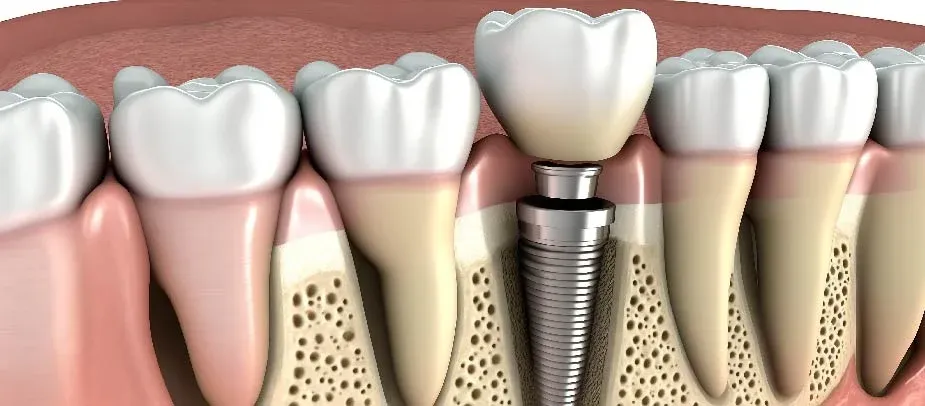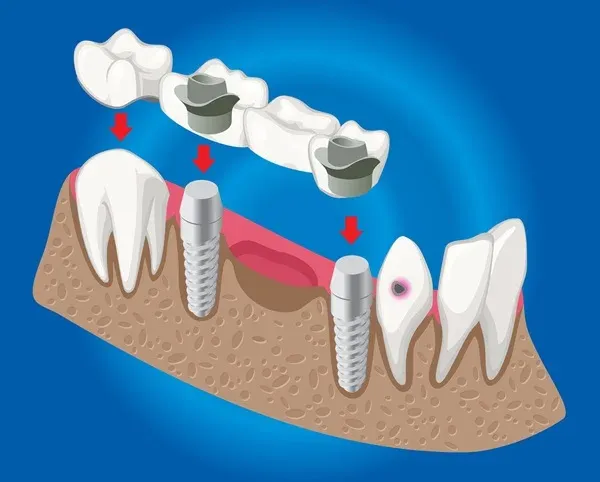More
More
Dental Implants: What You Should Know?

Dental implants are an effective solution for replacing missing teeth. They provide a natural-looking and long-lasting option to restore your smile and improve your oral health. If you are considering dental implants, it is important to have a good understanding of the procedure, as well as the factors to consider before and after the treatment.
In this blog post, we will discuss what you should know about dental implants, the things to consider before the procedure, and the risks associated with implants.
What are Dental Implants?
Dental implants are artificial tooth roots that are surgically placed into the jawbone. These implants provide a strong foundation for supporting replacement teeth, such as crowns, bridges, or dentures. The implants are typically made of titanium, a biocompatible material that allows them to fuse with the jawbone and create a stable base for the replacement teeth.
Types of Dental implants You Need to Know.
Here are some of the most common dental implants’ types you need to know:
Single Dental Implant
A single dental implant is used to replace a single missing tooth. It consists of a titanium implant post that is surgically placed into the jawbone. Once the implant integrates with the bone, an abutment and a dental crown are attached to the implant post. It helps in creating a natural-looking and functional replacement tooth.
Implant Supported Bridges
Implant-supported bridges are an excellent solution for individuals who are missing multiple adjacent teeth. Instead of relying on natural teeth for support, dental implants are strategically placed to serve as anchors for the bridge. This type of implant-supported bridge provides stability and prevents bone loss, while also restoring the appearance and functionality of the missing teeth.

Implant Retained Dentures
Implant-retained dentures are an ideal option for individuals who have lost all or a significant number of their teeth. These dentures are supported by dental implants that are strategically placed in the jawbone. Implant-retained dentures provide a secure and stable fit. It leads to eliminating the need for messy adhesives while restoring the ability to eat, speak, and smile with confidence.
Full Arch Implants
Full arch implants, also known as All-on-4 or All-on-6 implants, are designed to replace an entire arch of missing teeth. This technique involves placing four to six dental implants strategically in the jawbone, which then serve as anchors for a full arch of prosthetic teeth.
Full arch implants offer a permanent and fixed solution that closely resembles natural teeth in both appearance and function.
Reasons to Get Dental Implants
Here is why you need to get dental implants:
Missing Tooth Replacement
Dental implants are an ideal solution for replacing a single missing tooth. Unlike dental bridges, which require the adjacent teeth to be reshaped to support the bridge, implants function independently. They are individually placed in the jawbone, providing a standalone replacement tooth that looks and functions like a natural tooth.
Restored Chewing Ability
Missing teeth can make it challenging to bite and chew properly, affecting your ability to enjoy your favorite foods. Dental implants restore your chewing ability, allowing you to eat comfortably and enjoy a varied and nutritious diet.
Keep Your Jawbone from Shrinking
When you lose a tooth, the surrounding jawbone can start to deteriorate over time. Dental implants help preserve the jawbone's structure and prevent bone loss.
By stimulating the bone through the chewing action, implants promote bone growth and maintain the natural shape of your face.
Preserved Surrounding Bone and Gums
Unlike other tooth replacement options, such as dentures, dental implants do not require support from adjacent teeth or rest on the gumline. This means that the surrounding teeth and gums are not negatively impacted by the implant. It helps to preserve their health and integrity.
Ensured Adjacent Teeth Stability
When a tooth is lost, the neighboring teeth can shift and become misaligned over time. Dental implants prevent this from happening by providing a stable anchor for the replacement tooth.
By keeping the surrounding teeth in their proper positions, implants help maintain a balanced and aligned smile.
Improved Life Quality
Dental implants not only restore your smile, but they also enhance your overall quality of life. With implants, you can speak, eat, and smile with confidence, knowing that your teeth are secure and stable.
Implants eliminate the discomfort and inconvenience of removable dentures, allowing you to enjoy a natural-looking and permanent solution.
Things to Consider Before Dental Implants
Before proceeding with dental implants, there are a few important factors to consider:
Oral Health
Good oral health is crucial for the success of dental implants. It is essential to have healthy gums and adequate bone density to support the implants. If you have any existing dental problems, such as gum disease or tooth decay, they should be addressed before implant placement.
Overall Health Conditions
Certain medical conditions and medications can affect the success of dental implants. It is important to discuss your medical history with your dentist to ensure that you are a suitable candidate for the procedure.
Commitment to Oral Hygiene
Dental implants require regular oral care, including brushing, flossing, and regular dental check-ups. It is important to be committed to maintaining good oral hygiene to ensure the longevity of your implants.
What to Consider After Dental Implants Procedure?
After getting dental implants, there are a few important considerations to keep in mind:
Healing Process
It is normal to experience some discomfort, swelling, and bruising after the implant surgery. Follow your dentist's instructions for post-operative care, including pain management and diet restrictions.
Oral Hygiene
Maintaining proper oral hygiene is crucial to prevent infection and ensure the long-term success of your implants. Brush and floss regularly and use an antibacterial mouthwash as recommended by your dentist.

Diet Restrictions
During the initial healing phase, it is essential to stick to a soft diet and avoid hard, chewy, or sticky foods that can put stress on the implants. Your dentist will provide you with specific dietary guidelines.
Follow-up Appointments
Regular follow-up appointments with your dentist are important to monitor the healing process and ensure the implants are functioning properly.
Risks Associated with Dental Implants
While dental implants have a high success rate, there are some risks and complications to be aware of:
- Infection: Like any surgical procedure, there is a risk of infection at the implant site. Proper oral hygiene and regular dental visits can help minimize this risk.
- Implant Failure: In rare cases, dental implants may fail to integrate with the jawbone or become loose over time. This can happen due to factors such as poor oral hygiene, smoking, or certain medical conditions.
- Nerve Damage: The placement of dental implants involves working near nerves in the jaw. In rare cases, nerve damage can occur, leading to numbness or tingling sensations in the lips, gums, or chin.
- Sinus Problems: Dental implants placed in the upper jaw can sometimes protrude into the sinus cavity, causing sinus issues. This can be avoided with proper treatment planning and implant placement techniques. Dental implants are a reliable solution for replacing missing teeth. You can make an informed decision about whether dental implants are the right choice for you. It is possible by considering the factors discussed before and after the procedure and being aware of the potential risks. Consult with a qualified dentist to determine your eligibility for dental implants and to discuss any concerns or questions you may have. With proper care and maintenance, dental implants can provide you with a beautiful smile and improved oral health for years to come.
Contact your dentist today in San Jose, Dr. Amir HagShenas, at Silicon Valley Smile Solutions, to learn more about Dental Implants.
This media/content or any other on this website does not prescribe, recommend, or prevent any treatment or procedure. Therefore, we highly suggest that you get the advice of a qualified dentist or other medical practitioners regarding your specific dental condition.
213 views
comments
Comments
Get In Touch
Fill out the form below to request a consultation or ask a question. You can also request a video consultation.
I understand the information disclosed in this form may be subject to re-disclosure and may no longer be protected by HIPAA privacy regulations and the HITECH Act.
The Highest Standards. The
Most Satisfied Patients.
